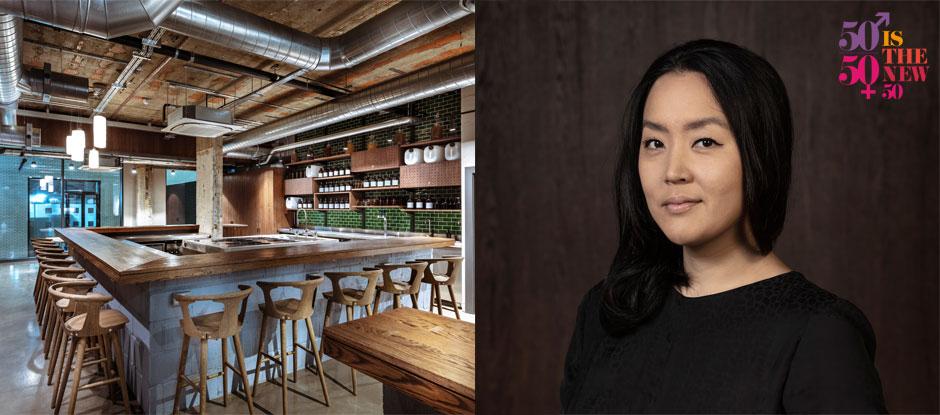Bartender, entrepreneur, industry leader and agent of change: Monica Berg is a woman of many talents. Get to know the winner of the Altos Bartenders’ Bartender Award at The World’s 50 Best Bars 2019 and go behind the scenes at one of London’s most exciting new bars, Tayēr + ElementaryAt Tayēr + Elementary, the most unique and expensive glassware – an intricate, unique piece handmade in Czech Republic and modelled after the bark of a tree – is used to serve water. This speaks volumes about the attention to detail that characterises Monica Berg and Alex Kratena’s new London bar, as well as their fervent passion to make drinks accessible and egalitarian.
As the couple’s first own bar nears its six-month birthday, Berg is celebrating winning the Altos Bartenders’ Bartender Award, an accolade voted by her peers who head up the venues in The World’s 50 Best Bars list. This year, Tayēr + Elementary debuted at No.52 in the ranking, making it the highest new entry in the extended 51-100 list.
The bar industry’s favourite bartender started her career in Oslo, where she gathered up experience at a variety of venues – from dive bars to nightclubs – before she took over the H.Butlers Bartending School in her early twenties. Always a high-achiever, she followed her early successes by honing her skills at London’s Pollen Street Social, then at Oslo’s award-winning bar Himkok. In recent years, she launched her own liqueur, Muyu, and co-founded P(our), a non-profit and educational symposium for the bar industry.
Since its inception in 2016, P(our) has held events around themes such as ‘the modern bartender’, gender and ‘perfection’. “We want to be a platform and a symposium that is worthy of the industry we belong to, that celebrates it and helps make changes from within. We want people to understand that they're not just bartenders, they can change things – it doesn't matter who you are or where you're from,” she explains.
Get to know the bar industry luminary through six quotes that define her new venue, her drinks philosophy and her life behind the bar.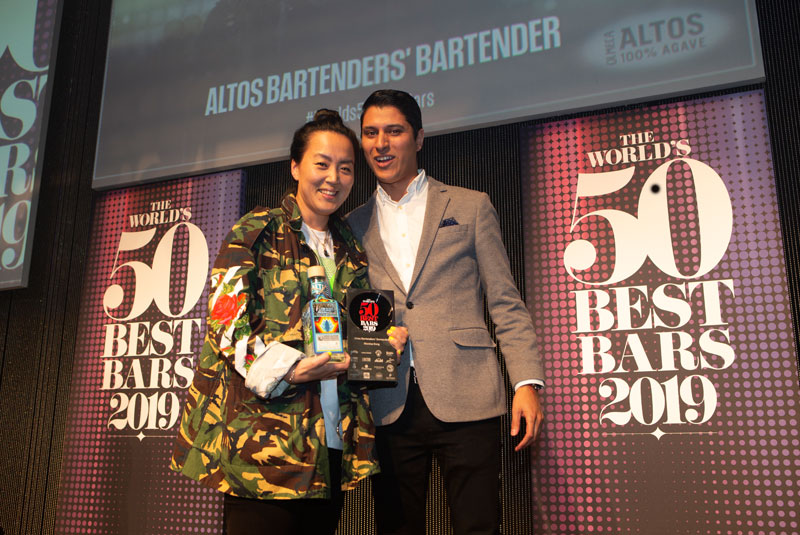
Berg receives the Altos Bartenders' Bartender Award at The World's 50 Best Bars 2019
The bar – “Tayēr means workshop, because nothing here is ever finished”
After four years in the works, Tayēr + Elementary opened in June 2019 in London’s Old Street neighbourhood as two venues in one. Elementary is the bar at the front that overlooks the busy street, an open-all-day concept with a drinks list rooted in classics, but also showcasing some lesser-known ingredients. Here, you can taste cocktails mixed with neroli oil-flavoured soda (a floral essential oil) or vetiver, a type of bunchgrass native to India. Crossing over to the room in the back, you find yourself in Berg and Kratena’s playground proper: Tayēr.
“At Tayēr, we want to celebrate ingredients that may be common but underappreciated, like a really good apple at the peak of its season,” says Berg. “We want to show people that cocktails, and even food, are not necessarily about the expensive or exclusive ingredients. Elementary is your neighbourhood bar where you go to have fun and drink your favourite cocktail. Tayēr is where you go to try something new.”
The menu is in constant evolution – it changes two to four times a week, based on which products are in season, the team’s inspiration and their latest experiments. “Tayēr comes from Spanish and means workshop,” explains Berg. “It represents the fact that nothing here is ever finished. Just because a cocktail is on the menu, doesn't mean that it can't be improved.” As well as the ever-changing cocktail list, the bar also offers a hand-picked selection of beers and wines.
Berg and Kratena have one more ace up their sleeves. In between Tayēr and Elementary is a narrow kitchen where chefs from Ta Ta Eatery – a celebrated Asian-European concept – prepare the bespoke menu served at the ‘Kitchen Counter’ in the evening. “When we started dreaming of this bar, we knew food had to be part of it. The setting is different when food and drinks are combined – it's not just going out and getting drunk, it's not just sitting down and eating to get nourishment, it's about the enjoyment the two can bring together,” says Berg.
Despite its high level of development, Tayēr + Elementary is still a very young venue, less than six months old – a fact that Berg never forgets. “It still feels slightly unreal,” she notes. “Every morning, I come in here and think 'Wow, this is my bar'. It's the result of the last four years, but also of the previous 20 years working in the industry. I don't think I've ever been happier.”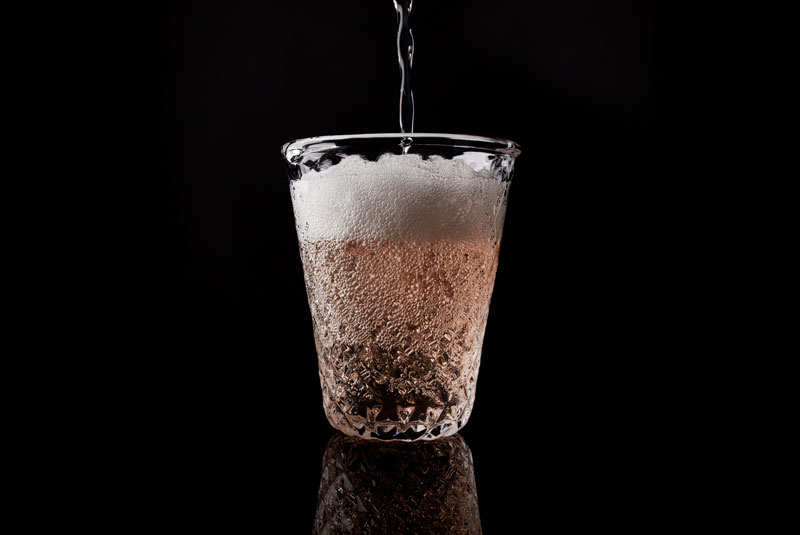
Tayer's cocktail with aquavit, rhubarb and Muyu Jasmine Verte
The creative process – “Hierarchies don’t work. Here, everyone is equal”
Berg defines Tayēr + Elementary’s cocktail creation process “a bit unusual”: each drink is the result of the team’s collective effort and nothing goes on the menu unless everyone has tasted it and agreed it’s ready. “We only separate between kitchen and bar in the team,” she explains. “There is no hierarchy, because in my experience, hierarchies often don't work. It's a very comfortable way of passing blame onto other people. Here, everyone is equal.”
To demonstrate how the creative process works, Berg takes the example of a drink she started working on earlier this year. “I really enjoy working with fermentation, so this summer, I got a nice batch of redcurrants and did a non-alcoholic fermentation,” she says. “After three and a half weeks, I tasted it – it was probably one of the best fermentations I’d ever done. I had this idea to make a drink that would taste as much like redcurrant as humanly possible.”
Soon after, however, Berg left on a business trip – only to come back and discover her redcurrant drink was almost finalised. “It was a completely different drink than I would have ever imagined,” recalls Berg. “At first, I was slightly disappointed, because I wasn't able to make the drink I had in my mind. Then, I tasted the drink and it was amazing – it was so popular that we ran out within a week.
“When no one creates a single cocktail, but every cocktail is a product of the team, the drinks are so much better for it. But you have to be willing not to take the credit.”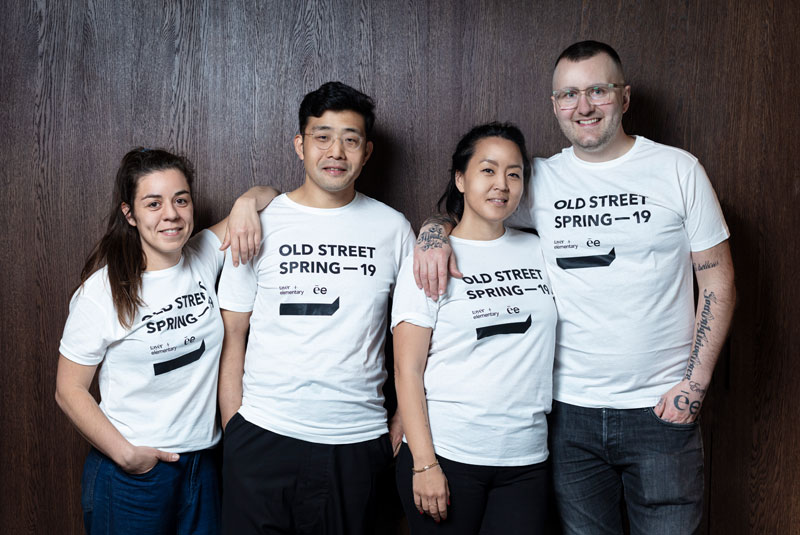
Tayēr + Elementary's team, including Berg and Kratena (right)
The test – “Would you serve it to your mother?”
The cocktails on Tayēr’s menu all share one characteristic – Berg wants them to be accessible to anyone. “We want people to become more familiar with drinks and the processes behind them, so that they can understand them. Unless you understand something, it's very difficult to appreciate it to the full extent,” she argues.
For this reason, before a drink can make it on Tayēr + Elementary’s menu, it has to pass an important test. “We always ask: 'Would you serve this to your mother?',” says Berg. “For most people, their mother is the benchmark. If you wouldn't serve it to your mother, why would you serve it to anyone else? Doesn't everyone deserve the same kind of respect and care?
“Then, we ask: ‘Would your mother understand this cocktail?’”. The idea of making drinks more accessible is very close to Berg’s heart, as the bartender is determined to remove the barriers that can sometimes put people off from wandering into cocktail bars that are considered “innovative” or “a bit out there”.
“We become so specialised in what we do that we forget there is a whole group of people out there who are still novice at drinking,” she says. “Drinking should be fun. You shouldn't go to a bar and be scared to order. Sometimes, people come in and say: 'I would really like a beer, I'm really sorry'. I ask them: why are you apologising? I'm not one to judge what you drink – as long as you're happy, I'm happy.”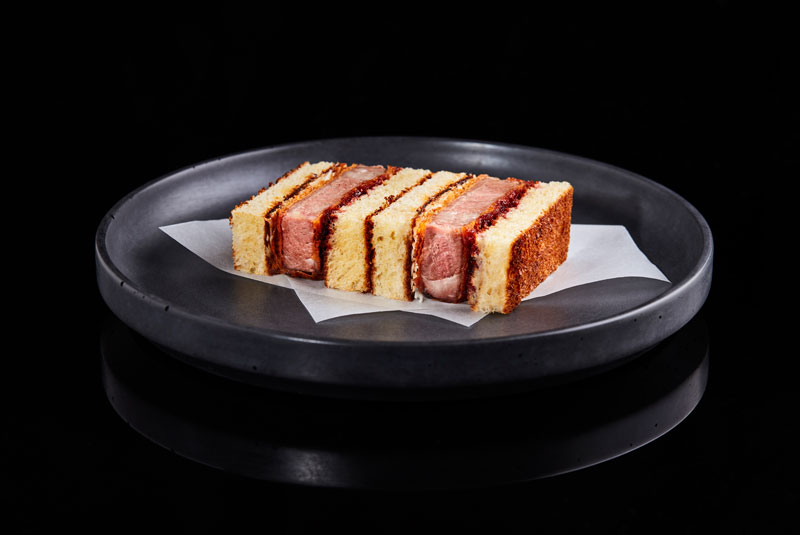
The Kitchen Counter's Iberian Pork Sando
The drinks – “You only have one sip to convey all the different flavour layers”
The cocktails on Tayēr’s menu are often unique – while they sometimes take inspiration from classics, they’re also not afraid of being different. “As a bartender, at some point you have to make the choice of whether it's more important to you that your cocktails be historically correct or delicious. For us, deliciousness is the priority. Spirits have changed, ingredients have changed, people have changed, so it's only natural that cocktails evolve.”
The main challenge for Berg is to convey the different layers of flavour into a single sip. “When you think of a peach, what makes it so delicious are all the nuances. The texture when you bit into it, the sweetness, the little hint of acidity – that’s the complexity of its flavour. You can't just make a peach syrup or an infusion – if you truly want to capture the flavour of the ingredient, you need to use different techniques to get each layer,” she explains.
Berg and the team used this technique to come up with the recipe for Tayēr’s black truffle Martini. The bar’s house gin, which comes from a small distillery in the north of England, is fat washed in truffle-infused oil, a process that allows it to acquire the truffle’s aromatic properties. The cocktail also mixes some distilled truffle, “because that’s where the flavour sits”, and a sweet-style vermouth with vanilla tones to ground the truffle aroma.
“With food, you have textures and you have the luxury of taking several bites. In a drink, it's one sip and all the flavours have to be there,” says Berg. “The black truffle Martini is representative of Tayēr’s style, because it's simple, but very effective. Using the right techniques in the right places, you can create very good drinks without having to work too hard.”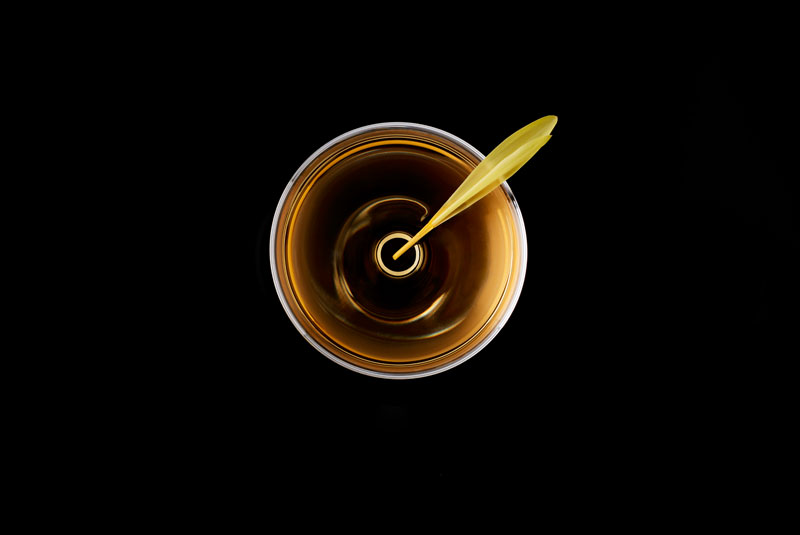
Tayēr's cocktail with bourbon, amber, aquavit, fino sherry and caroob
Sustainability – “Even if fish aren’t cute and fuzzy, they’re alive”
Berg grew up in Norway, where she and her family lived in close contact with nature, often going on fishing and hunting trips. “Since I was nine, one of my responsibilities at home was to keep the sourdough starter alive,” she recalls. “Then, every Sunday, I would go into the forest and pick mushrooms, or catch and smoke different types of fish.
“At the time, I didn’t understand how lucky I was, but those experiences led me to understand that even if fish aren’t cute and fuzzy, they’re alive. I learnt to respect life. They gave me the right values – if you're going to kill an animal, at least use the whole animal, otherwise it's wasteful. Flavour is not always pretty, but it’s the most important thing,” she says.
Following her unique upbringing, Berg wanted Tayēr + Elementary to be an example of a sustainable bar in all facets. “You have to look at the true cost of your dish, your drink or your bar. Where does the wood come from? The bricks? You can always make choices,” she says. “Sometimes, we forget that there are multiple facets to sustainability. We focus on the environmental and we forget the financial or the social side of it.
“It's very important to me that people are happy. This is why there is no back of house here – there is nowhere you can yell at anyone. I also feel the responsibility of having 10 people working with me. It's fulfilling to create a new cocktail or make the guests happy, but at the end of the day, you need to make sure that you make the right choices so that you can deliver to the people who work with you and your suppliers.”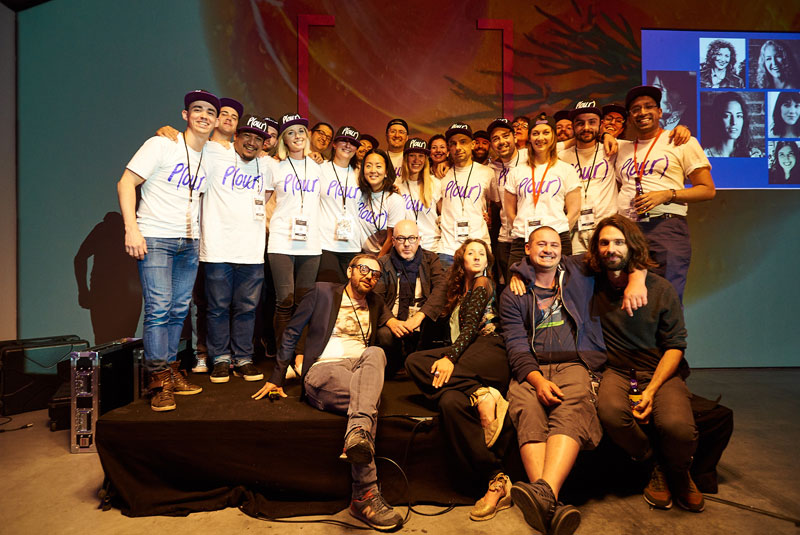
Group picture at P(our) symposium
Gender – “For the first 10 years of my career, I was a bartender. Then, I became a female bartender”
Over her career in the bar industry, Berg noticed one key change. Around the 10-year mark, when she started to be considered successful, people stopped referring to her as a 'bartender' and bestowed upon her the new role of ‘female bartender’. “In the beginning, I had very conflicting feelings about it. I didn't understand why everyone kept asking me: 'How does it feel to be a female bartender?' I don't know, because I don't know any other way of being a bartender,” she says.
“For a long time, I dismissed it. Then, I started to travel more, and I understood that privilege is ironic, because if you're privileged, you don't know that you are.” Realising that in other countries women in the bar industry faced different challenges pushed Berg to reconsider her position.
“You start to understand that once you get to a point where you have a voice that other people will listen to, you have to use it for good,” she says. “For me, [being a woman] hasn't necessarily been a struggle, but for other people it is. I understand that I have to speak up when I feel that something is wrong, and sometimes it's uncomfortable because people will come for you, especially on social media, but I have to.”
At the same time, Berg is keen to move the conversation beyond gender. “We have to adapt the conversation to the time we live in. I would love to come to a place, not only in our industry but in society in general, where it's a conversation about individuals rather than gender,” she says.
A recent example comes to mind – soon after winning the Altos Bartenders’ Bartender Award, Berg took part in an exchange that surprised her. “Someone said to me: ‘Congratulations on being the best female bartender’. Alex [Kratena] was like: ‘No, it's just bartender’. And I was like oh yeah, actually, it is. It's not a gendered award, and if you look at the bigger picture, that is a great example of how the industry is already changing.”
Now enter The World's 50 Best Bars celebrations and recap some of the best moments in the video:
‘50-50 is the new 50: promoting equality, inclusivity and balance’ is a content series by 50 Best that features individuals and initiatives in the restaurant and bar industries that are working to create a more humane, fair and positive environment for every member of society.
To stay up to date with news and videos from The World's 50 Best Bars, find us on Instagram at @50BestBars, follow us on Twitter at @50BestBars, like us on Facebook at facebook.com/50BestBars and subscribe to our YouTube channel.
